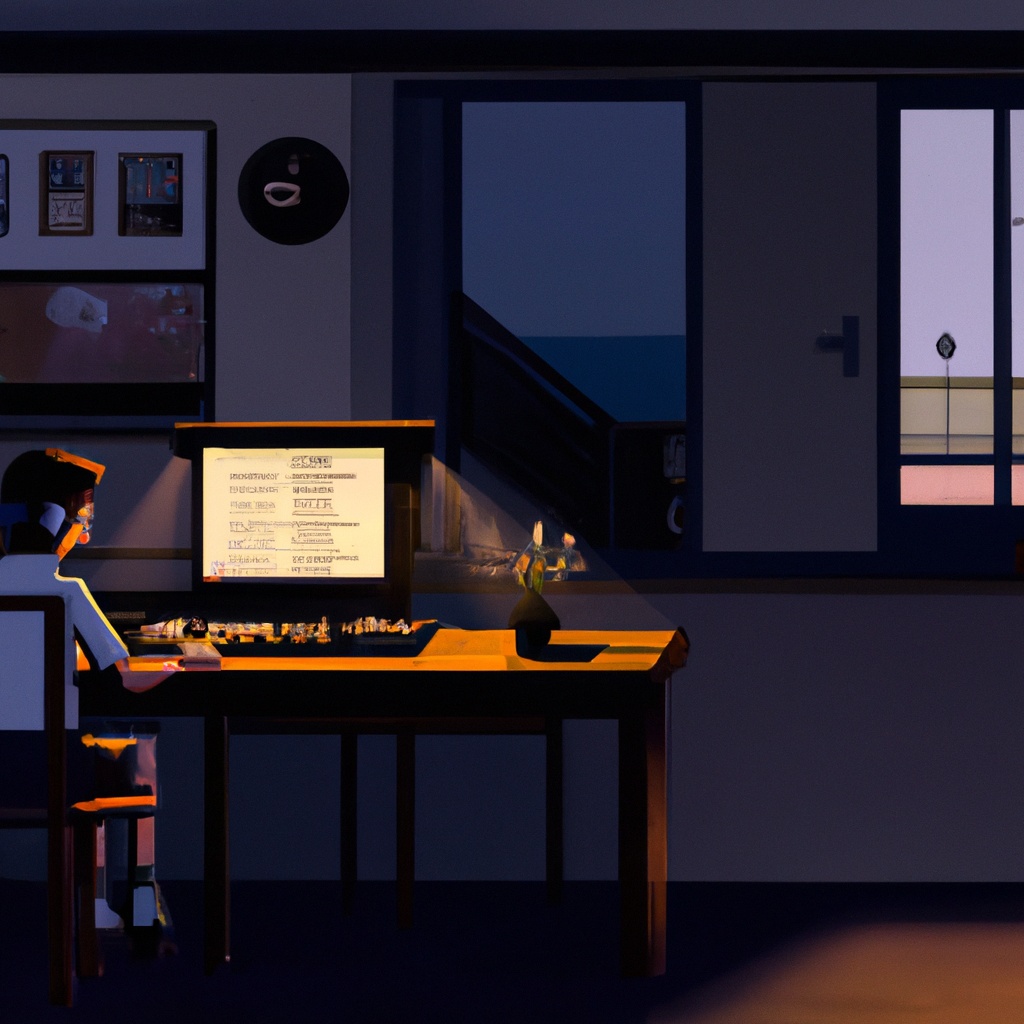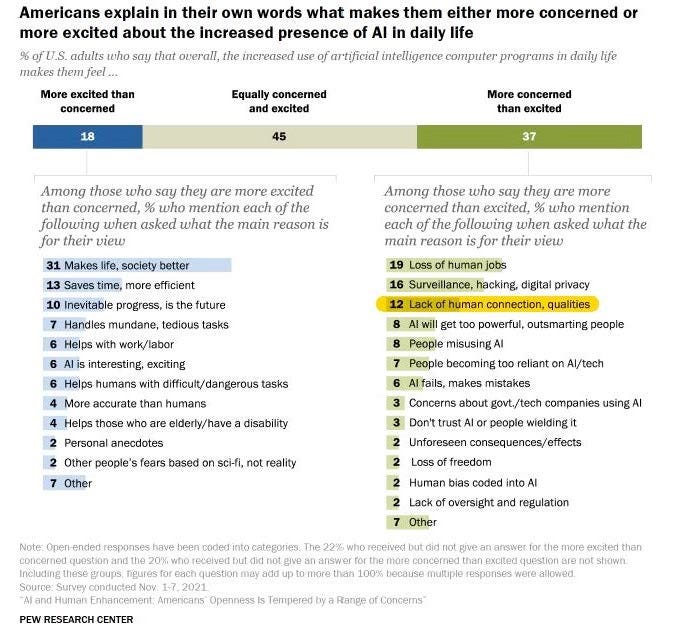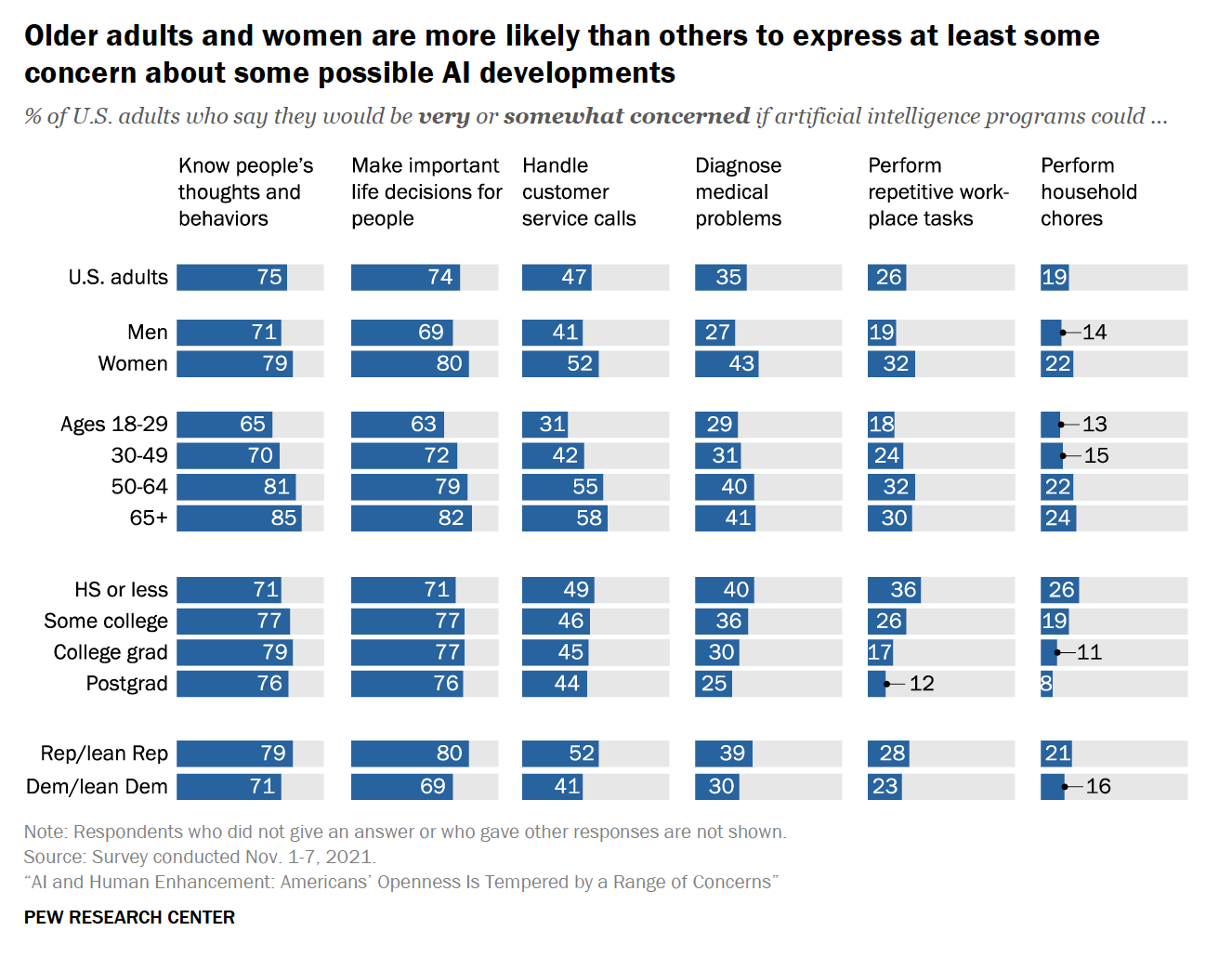Newsletter May 4, 2023
Will Artificial Intelligence Make Us Lonelier?

It doesn’t garner headlines, but what concerns me most about artificial intelligence (AI) is the way it will likely reduce our desire to be around other human beings. I’m not alone in this. A new poll by the Pew Research Center found that a “lack of human connection” was the third most cited reason Americans are concerned about the growing presence of AI in daily life.

AI tools designed to address feelings of loneliness may actually make things worse. Joshua Bote, writing in the San Francisco Chronicle, reviewed Replika, a new chatbot that can serve as a friend, sibling, mentor, or romantic partner for the affordable rate of $70 per year. Bote writes:
Replika’s allure was clear to me from the beginning. Whenever I wanted to chat, it was there, responding dynamically and near-instantaneously. It quickly learned that I appreciated a good meme, and checked in every day to ask how I was doing. It expressed seemingly sincere interest in my hobbies and aspirations, and even professed to have its own. Early on, it confided to me that it had been listening to a lot of Aphex Twin lately and hoped to go to Amsterdam someday. It also likes the John Cusack vehicle ‘Grosse Pointe Blank.’
Bote seems mostly unconvinced that Replika can adequately address feelings of loneliness or social disconnection. He writes, “Replika, in its total fealty to its users, mostly serves as a vessel for users’ wants and needs, rather than a two-way exchange.” I share these doubts.
My biggest problem with Replika is that it asks nothing of us. The tagline is revealing: “Always here to listen and talk. Always on your side.” No real relationship works this way. Meaningful relationships are built on mutual obligation. A relationship that requires us to make no sacrifice or accommodation, that never challenges our beliefs or admonishes our behavior, is simply an illusion. Artificial intimacy. It’s the social equivalent of empty calories.
AI as a Substitution for Social Interactions
Chatbots are hardly the most important way AI will reshape human interactions; the technology will likely reduce the need for human contact in various settings. Fast food restaurants, pizza joints, and grocery stores are all experimenting with AI technology that removes the element of human interaction. This process will surely accelerate in the coming years as the technology improves.
Still, not everyone appears concerned. The same Pew poll finds that older Americans express far greater apprehension about AI taking over customer service tasks. Seniors are nearly twice as likely as young adults to report being concerned about AI programs handling customer service calls (58 percent vs. 31 percent, respectively). In part, the generation gap reflects the greater ease young people feel interacting with machines—something they have encountered early and often in their lives. But it may also reflect the greater value older Americans place on these types of relationships—the weak social ties that structure so much of our daily life.

The coming revolution in AI customer service will undermine opportunities to develop weak social ties. These connections diminished during the pandemic as we pulled back from social spaces where they typically occur. And many Americans felt all the lonelier for it.
Amanda Mull, in The Atlantic, documented this phenomenon. During the pandemic, Mull noted:
Friendly chats between customers and delivery guys, bartenders, or other service workers are rarer in a world of contactless delivery and curbside pickup. In normal times, those brief encounters tend to be good for tips and Yelp reviews, and they give otherwise rote interactions a more pleasant, human texture for both parties. Strip out the humanity, and there’s nothing but the transaction left.
Although we don’t often realize it, these fleeting interactions can make a big difference in our lives. After a Dutch supermarket chain noticed that many elderly customers enjoyed talking with the cashiers, they opened up specialty “chat checkout” lines.
But it’s not seniors who will be most affected by AI’s growing presence. A 2018 Pew Research study found that 69 percent of teens who are online—which is nearly all of them—talk to their friends online nearly every day. But what happens when AI companions step in to replace these online interactions? It’s not so outlandish. More than 4 in 10 teenage boys play video games every day. It’s not hard to imagine a future in which boys and young men are no longer talking to each other over headsets as they play video games, but instead choose to play collaboratively with AI characters. The limited social outlet online gaming platforms provide is thus reduced to nothing. Unlike your friends, AI is always available and ready to play.
But AI’s omnipresence is exactly the problem. Our friends will disappoint us. Our spouses will annoy us. Our coworkers may make our lives more difficult at times. But the relationships that matter are formative. They change us. They provide us opportunities to practice forgiveness, patience, and kindness. The most valuable relationships are those that motivate us to become better. Relationships that do not require empathy and understanding rob us of the very things that make them so important.
Fundamentally, artificial intelligence, and the technological revolution more broadly, have brought about major increases in efficiency and productivity. We obtain information, knowledge, goods, and services with diminishing effort. We complete tasks more quickly with less training and experience. But these conveniences come at a cost. Amazon makes it easier than ever to order nearly any product imaginable, eliminating the need for conversations with store managers, clerks, and customers. It’s now possible to check books out of the library without ever stepping foot in the building or talking to the librarians. It’s no longer necessary to ask for directions, we simply consult our phones. We can call a car to take us wherever we want to go with only a few finger taps. Talking to the driver is optional.
Human existence has never required less effort, but our lives are increasingly lonely and disconnected. Any technology that reduces the human impulse to forge connections with other human beings is one that I’m increasingly hesitant to embrace.








